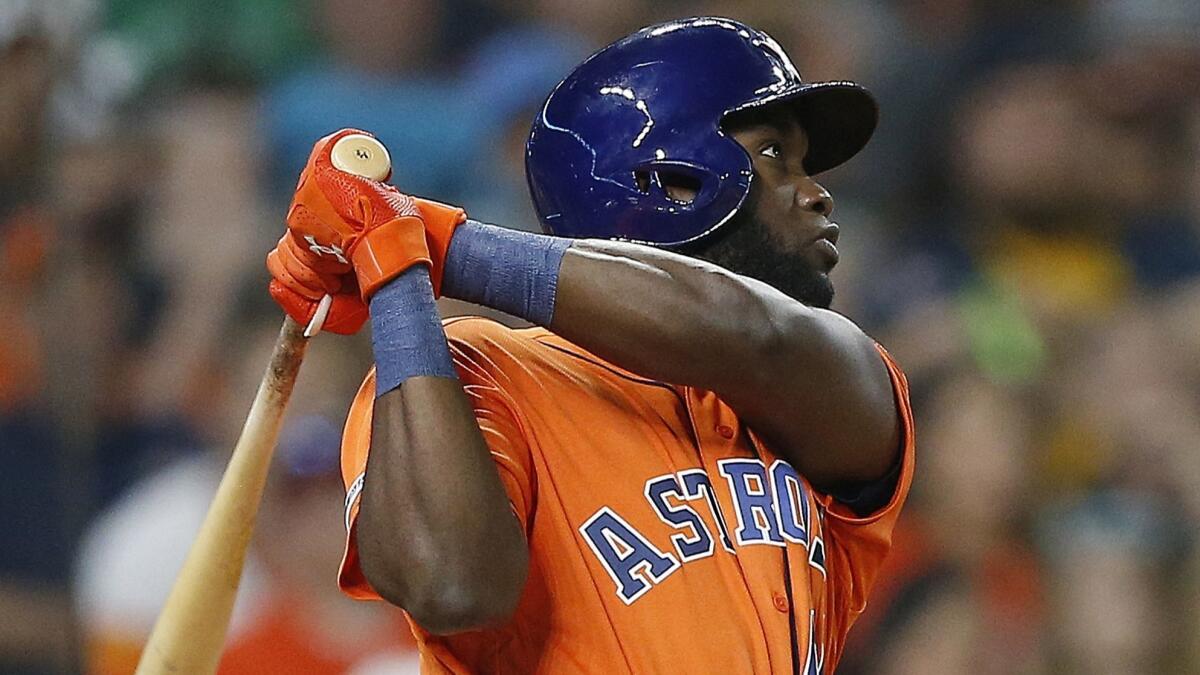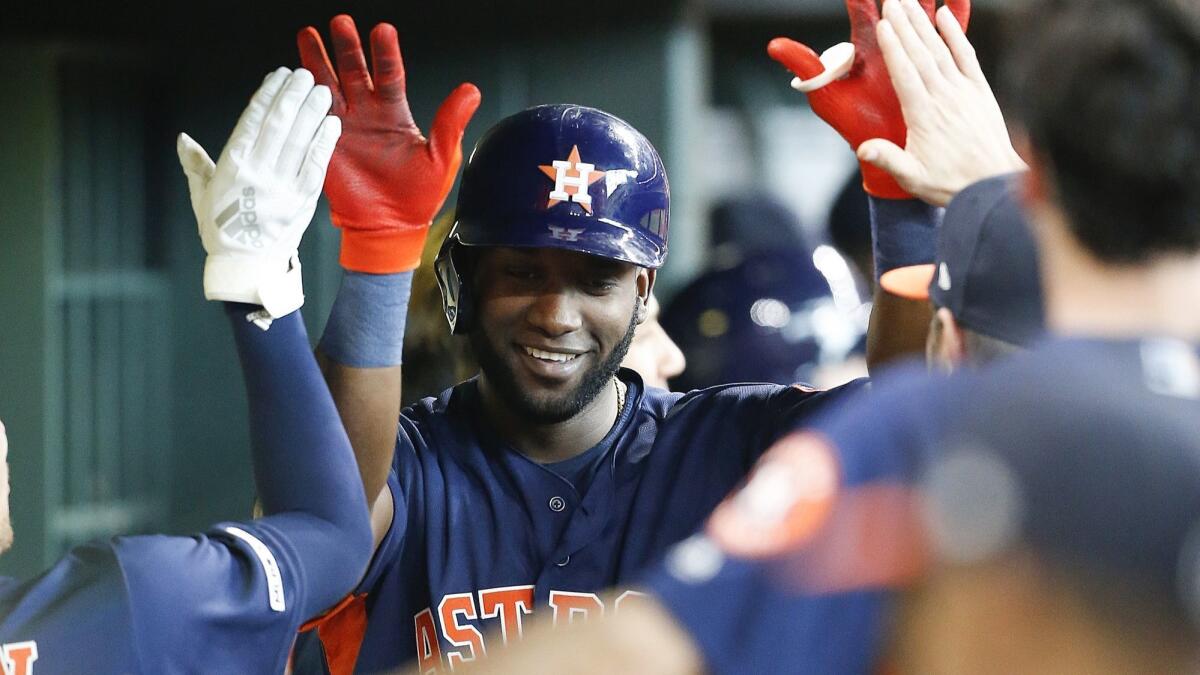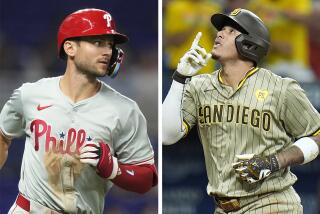How the Houston Astros nabbed slugger Yordan Alvarez from the Dodgers

- Share via
Reporting from houston — The request reached Farhan Zaidi, then the general manager of the Dodgers, in the frenetic hours before the trade deadline Aug. 1, 2016.
“What about Alvarez, the Cuban?” Houston Astros general manager Jeff Luhnow said.
Luhnow had been haggling with several clubs over the return for Astros reliever Josh Fields, a pitcher teams coveted despite his near 7.00 earned-run average. The Dodgers had already rejected requests for “several players” in return and the two sides stood at “an impasse,” Luhnow said. Then Luhnow recalled a prospect who had entranced one of his scouts that year. So he asked about Alvarez.
The answer from Zaidi was swift: No, the Dodgers would not trade Yadier Alvarez.
The misunderstanding adds a punchline to what may become one of the most lopsided trades in recent baseball memory because Luhnow was not trying to acquire Yadier Alvarez, a Cuban pitcher signed by the Dodgers for $16 million in 2015 who has a 14.73 ERA in the minors in 2019. He sought Yordan Alvarez, a lightly touted, teenage position player with questionable power, a relative unknown who has developed into one of the sport’s most promising young sluggers and a fixture in Houston’s lineup.
Alvarez, now 22, had been signed by the Dodgers less than two months before Luhnow asked about him. He had yet to play a game in the Dodgers organization. He never would. The Dodgers agreed to trade him for Fields. They have watched from afar as Alvarez has blossomed into a 6-foot-5, 225-pound force. Fields was cut by the Dodgers this spring after 2 1/2 seasons.
“Looking back on it now,” Friedman said recently with a rueful smile earlier, “we obviously wish we would have said yes to other names they asked for before him. It’s pretty special watching what he’s doing in the batter’s box.”
Alvarez debuted in June and hit seven home runs in his first 16 games. He doubled Friday against the Angels and entered Saturday’s game with a 1.116 on-base-plus-slugging percentage.
Fields became a useful contributor for the Dodgers during the regular season, but was kept far from high-leverage moments in October. He had a 5.40 ERA in eight postseason appearances. He surrendered two home runs in Game 2 of the 2017 World Series against Houston.
“We actually won that trade twice,” one former Astros official said.
Since replacing Ned Colletti in the winter of 2014, Friedman has traded a bushel of prospects for veteran talent. He has been one of the sport’s most aggressive pursuers of deadline help, shipping out minor leaguers for Rich Hill and Josh Reddick in 2016, Yu Darvish in 2017 and Manny Machado in 2018. Few of the traded players should haunt Friedman’s sleep.
Alvarez may be an exception. He defected from Cuba and established residency in Haiti in 2016. He landed on the radar of the Astros soon after, when Houston senior scouting adviser Charlie Gonzalez saw him during workouts in Florida. Alvarez reminded Gonzalez of Fred McGriff, though “not quite as pretty and fluid as the Crime Dog was,” Gonzalez said. Alvarez was gangly but coordinated. He impressed Gonzalez with his composure.
“He was just so calm,” Gonzalez said. “Saw the ball well. I saw him take a couple balls, 95 mph, up near his Adam’s apple. And a lot of guys, they’d been diving or bailing out the next pitch. And he just hung right in there.”
Gonzalez glowed about Alvarez to Astros front office. He visited with the prospect often. Alvarez insisted he wanted to be an Astro. He told Gonzalez he had already picked out an apartment near the team’s new complex in West Palm Beach, Fla.
But Houston had eyes elsewhere. The Astros spent nearly $12 million on international amateur signings that year, plus a five-year, $47.5-million deal for Cuban infielder Yuli Gurriel. When they bid on Alvarez, the Astros faced significant penalties for spending beyond the limits of their bonus pool. The potential consequences of meeting Alvarez’s price allowed the Dodgers to make a higher bid at $2 million.
Alvarez was far from a foolproof prospect. There were concerns about his defensive utility, which can be shielded as a designated hitter in the American League. The scouting consensus was bearish about his ability to drive the baseball. The Dodgers got him almost as an afterthought, Friedman said.

“We signed him the day before the period ended,” Friedman said. “And it was more because we were about to be cut out of big-ticket signings. Ironically, the big question in the industry at that time was about the power. Which, I’m not sure how that was the question.”
Friedman pointed to the ascendance of Alvarez as evidence of “the uncertainty, which the industry appreciates more now, about the Cuban market.” The thirst for Cuban players grew irrational in the wake of the arrival of stars Aroldis Chapman, Yoenis Cespedes, Jose Abreu and Yasiel Puig. That led to bloated, disastrous contracts for players such as Rusney Castillo and Yasmany Tomas. The list of flops signed by the Dodgers includes three players — Hector Olivera, Alex Guerrero and Erisbel Arruebarrena — on whom the team lavished $115 million.
Unlike Olivera, Guerrero and Arruebarrena, Alvarez never played a game in the Dodgers organization. His deal became official June 15, 2016, and he reported to the team’s complex in the Dominican Republic. He participated in workouts and waited for an assignment.
In the majors, the Dodgers were searching for bullpen help. They called about Fields, who had shown an ability to miss bats with the Astros. The negotiations with Houston dragged to the trade deadline. When the talks reached a standoff, Luhnow called Gonzalez.
As Gonzalez recalled the conversation, he heard from Luhnow and one of his lieutenants, Brandon Taubman:
“Who do the Dodgers have that we want?”
“Are you kidding me?” Gonzalez said. “Are you kidding me?”
Gonzalez stumped for Alvarez once more. Luhnow pocketed the recommendation and contacted the Dodgers. Friedman indicated he did not recall the mix-up between Yadier Alvarez and Yordan Alvarez; Zaidi did not respond to an interview request.
The Dodgers had invested a sizable sum in Yadier Alvarez, and felt compelled to protect their investment. They were less possessive of Yordan Alvarez, who was surprised by the trade. He was not sure how the process worked.
“I hadn’t even taken a swing yet for the team,” Alvarez said through interpreter Oz Ocampo. “And the Astros bet on my talent. For that, I’m grateful.”
Alvarez hit 12 home runs for two Class-A teams during his first full season in 2017. That number rose to 20 in 2018, as Alvarez graduated to triple A. He joined the big league club in June and homered in his second at-bat. The precociousness of his approach has caught the eye of Houston’s manager.
Sign up for our daily sports newsletter »
“I’ve watched him continue to be a dominant offensive force, because he has a game plan, and because he’s able to execute it,” A.J. Hinch said. “It’s a mature approach. Usually, you don’t see someone so patient, especially in the big moments, with guys on base.
“He’s not afraid to work the count. He’s not afraid to hit the ball the other way. He’s a threat from the minute he gets up there.”
Gonzalez saw those traits when he scouted Alvarez. The Dodgers saw enough to sign him. But they never got a chance to see him unveil those skills in games.
Friedman stressed that he enjoyed watching Alvarez succeed in the majors. The uniqueness of the situation provided him some peace.
“It’s one of those circumstances that I can’t ever see playing out again,” Friedman said. “There are times when we’ll go back and review something and try to learn from it. This, I’m not sure that anything we learned from it will be applicable to things going forward.”
Twitter: @McCulloughTimes
More to Read
Are you a true-blue fan?
Get our Dodgers Dugout newsletter for insights, news and much more.
You may occasionally receive promotional content from the Los Angeles Times.











